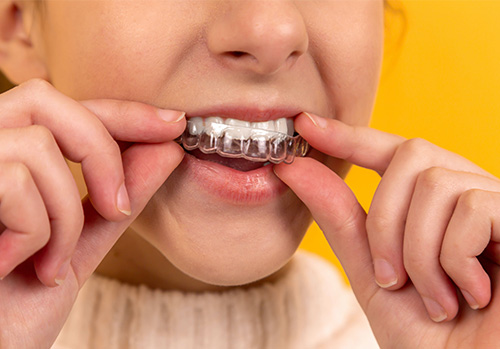
Photo by Diana Polekhina on Unsplash
Teeth Grinding: A Worn Out Habit
Anxiety and stress can manifest in the body physically, such as nail biting and sweaty hands, and in some cases, some truly painful and destructive nervous habits develop. One of these habits is bruxism, or the involuntarily clenching of the jaws and grinding of teeth together in sleep or even when wide awake. Around 13% of adults experience frequent sleep bruxism (SB), and when untreated, this can cause major issues with oral and jaw health. Let’s take a look at the common symptoms, causes, and possible treatments of bruxism and provide solutions on how to stop grinding teeth. However, we highly recommend if you are experiencing bruxism, you should contact your dental specialist or general practitioner for a proper assessment and treatment plan.
The Symptoms
Common symptoms linked to bruxism include a tightness of the jaw, pain in the jaw and teeth, disrupted sleep, headaches, earaches, TMJ, jaw locking, and worn, chipped, or loose teeth. Dentists will ask about pain or discomfort, especially in the morning, while looking for physical signs of bruxism in the teeth. Specifically, patients grind their teeth in such a way that the teeth will start to flatten at the tips and even chip under the constant force. It is also common for bruxism patients to dream about their teeth breaking or falling out, as well as clenching their jaw until their teeth break and being unable to control it.
What Causes Bruxism?
The common causes of bruxism in adults are anxiety and stress, smoking, alcohol, certain drugs and diseases, and sometimes heredity. Researchers have noted that this condition starts as a sleep disturbance in the central nervous system, and the factors listed above exacerbate the problem. Some anxiety or depression medications (such as SSRIs) can also induce bruxism in patients.
How Do You Stop Grinding Your Teeth?
Bruxism is a condition without a cut-and-dry cure, and different treatment methods can work for each patient. Techniques that reduce stress and anxiety can reduce the severity or even halt bruxism. Patients with awake bruxism can focus on behavioral changes to improve the position
of their mouth to avoid clenching during the day. Often, dentists recommend wearing a mouth guard or splint during sleep to prevent further damage to the teeth. It is also beneficial to limit screen time before bed, to practice calming exercises or meditation, and to avoid smoking and alcohol.
Thank you for reading! If you want to learn more about how to manage stress and anxiety, click here.
Have Health Insurance Questions?
We hope this information on how to stop grinding teeth is useful to you.
If you’d like to learn how we can help you reach your health goals, call Empower Brokerage at (888) 539-1633 to speak to one of our healthcare and ACA experts or leave a comment down below.
Get affordable life insurance quotes by clicking here.
See our other websites:

